 Kakhetian
Kakhetian
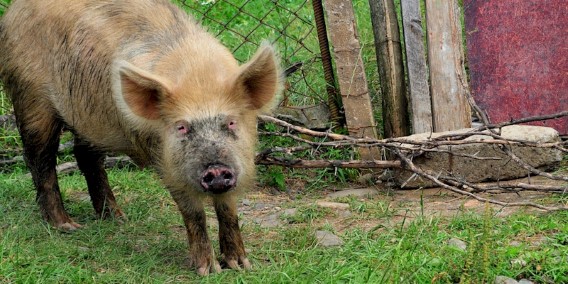 Originating from Kakheti, the picturesque eastern province of Georgia, Kakhetian Pigs stand as proud representatives of European swine breeds, revered for their unique characteristics and vital contributions to local husbandry traditions.
Originating from Kakheti, the picturesque eastern province of Georgia, Kakhetian Pigs stand as proud representatives of European swine breeds, revered for their unique characteristics and vital contributions to local husbandry traditions.
With their medium-size long heads, well-developed moving snouts, and short standing ears, Kakhetian Pigs present a striking silhouette against the backdrop of Kakheti''s rolling hills and verdant landscapes. Their flat, narrow, and short bodies, complemented by a convex back and tall, robust legs, epitomize the rugged resilience necessary for thriving in the region''s diverse terrains.
Embodying the essence of traditional Georgian agriculture, Kakhetian Pigs boast indrawn and short st ...

 Kele
Kele
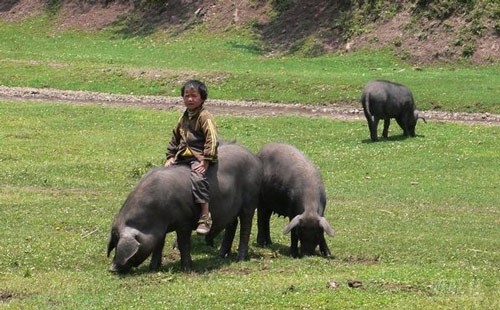 Kele Pigs are from Southwest China in the
Yunnan-Guizhou mountainous areas, where the altitude is between 1700 to 2400 m,
the climate is dry and cold during the winter, and humid in summer, and
characterized by erratic changes in weather. Kele pigs have exceptionally thick
back fat (5.1 to 7.2 cm) most likely because these pigs are bred for extra fat,
since people in mountainous areas have a special demand for fat in their diet.
Kele Pigs are from Southwest China in the
Yunnan-Guizhou mountainous areas, where the altitude is between 1700 to 2400 m,
the climate is dry and cold during the winter, and humid in summer, and
characterized by erratic changes in weather. Kele pigs have exceptionally thick
back fat (5.1 to 7.2 cm) most likely because these pigs are bred for extra fat,
since people in mountainous areas have a special demand for fat in their diet. Kele Pigs generally have a arched back and loin, long straight snout, narrow chest, wrinkled hind legs, strong feet, and light body. Also they are relatively low in prolificacy, with a litter size about 7 to 8 and 5 to 6 pairs of teats.

 Kemerovo
Kemerovo
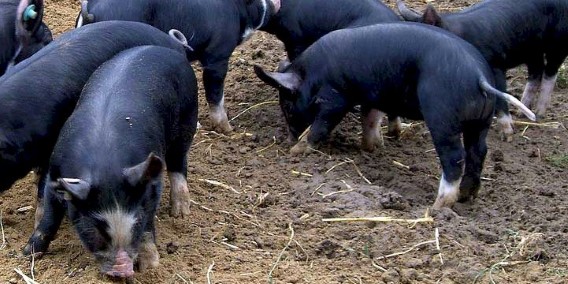 Kemerovo Pigs are a general-purpose pig breed from the Kemerovo
region of Russia. They were developed by the crossbreeding of local late-ripening
pigs with large white, white long-eared, Berkshire, Great Black and Siberian
northern breeds. In 1960 they were approved as an independent breed. The result
is a pig with good adaptability to cold temperatures, high rates of early
maturity, and large liters. The Kemerovo breed is divided into two types - meat
and general purpose.
Kemerovo Pigs are a general-purpose pig breed from the Kemerovo
region of Russia. They were developed by the crossbreeding of local late-ripening
pigs with large white, white long-eared, Berkshire, Great Black and Siberian
northern breeds. In 1960 they were approved as an independent breed. The result
is a pig with good adaptability to cold temperatures, high rates of early
maturity, and large liters. The Kemerovo breed is divided into two types - meat
and general purpose.
Kemerovo pigs are characterized by a strong constitution and correct physique. They are predominantly black but sometimes black and white. They have a good layer of dense bristles and are well adapted to harsh climatic conditions.
Today ...

 Korean Native
Korean Native
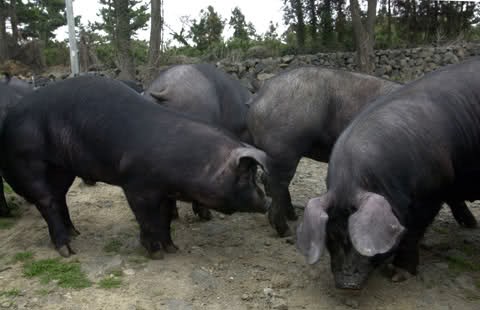 Korean native pigs are distinguished by their sleek black glossy hairs, characteristic caved face, and a notably protruded mouth complemented by large, expressive eyes. Their straightly upright ears add to their distinctive appearance, while their physique features a round shoulder, narrow rear, and wide chest, coupled with long hips and well-balanced short legs. Notably, they boast 10-12 teats, reflecting their reproductive prowess.
Korean native pigs are distinguished by their sleek black glossy hairs, characteristic caved face, and a notably protruded mouth complemented by large, expressive eyes. Their straightly upright ears add to their distinctive appearance, while their physique features a round shoulder, narrow rear, and wide chest, coupled with long hips and well-balanced short legs. Notably, they boast 10-12 teats, reflecting their reproductive prowess.
Renowned for their propagating power, Korean native pigs are prized for their superior meat quality and robust adaptability. These traits make them highly sought after by farmers and breeders alike, as they offer a combination of excellent breeding capabilities and desirable meat characteristics.

 Krskopolje
Krskopolje
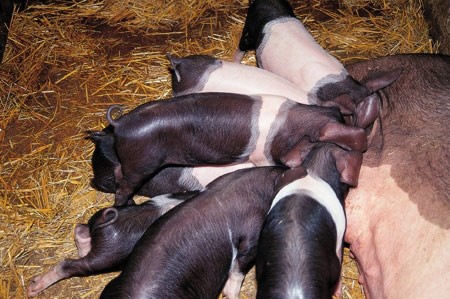 Krskopolje Pigs, affectionately known as Blackbelted pigs, hail from the picturesque Carniola and Styria regions of Slovenia, where they have long been cherished for their unique appearance and robust characteristics.
Krskopolje Pigs, affectionately known as Blackbelted pigs, hail from the picturesque Carniola and Styria regions of Slovenia, where they have long been cherished for their unique appearance and robust characteristics.
These distinctive pigs are easily recognizable by their striking black hindquarters adorned with a broad white stripe encircling their bodies like a belt. Their medium-length, flat heads are complemented by large, drooping ears, adding to their distinctive charm.
Krskopolje Pigs are celebrated for their commendable fertility, hearty appetite, and impressive growth potential. Upon reaching maturity, these pigs boast a substantial adult weight ranging between 250 and 300 kilograms, reflecting their robust b ...

 KuneKune
KuneKune
Initially teetering on the brink of extinction, KuneKunes were once solely found in New Zealand, where they were cherished by the indigenous Maori people. Fortunately, concerted efforts have led to their resurgence, and they are now widely bred, cherished not only for their unique attributes but also for their endearing and friendly personalities, making them beloved ...
